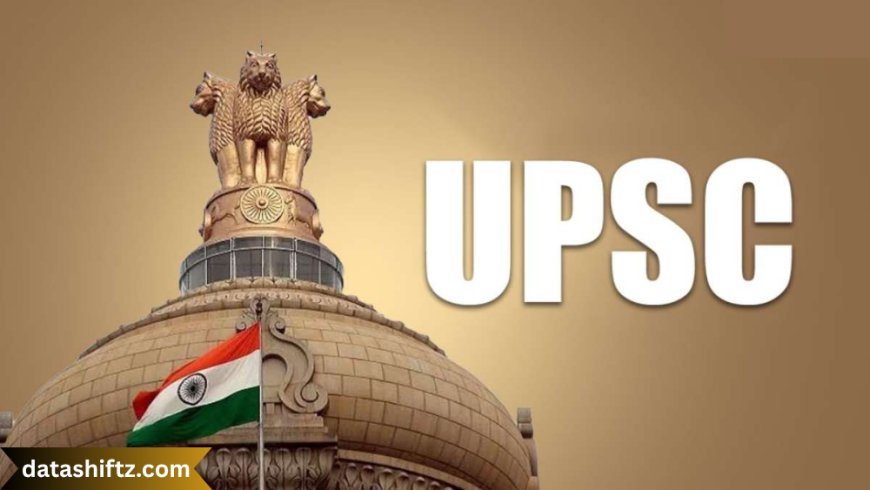UPSC: Unlocking the Gateway to India’s Civil Services

Introduction
The Union Public Service Commission (UPSC) is one of the most prestigious institutions in India, responsible for conducting various competitive examinations to recruit candidates into the civil services. For millions of aspirants each year, UPSC represents not just an examination but a dream — to serve the nation in roles such as IAS (Indian Administrative Service), IPS (Indian Police Service), IFS (Indian Foreign Service), and other esteemed government posts.
Cracking the UPSC Civil Services Examination (CSE) is considered one of the toughest academic challenges in the world. It demands a combination of intellect, discipline, perseverance, and a genuine passion for public service. In this detailed blog post, we will explore the structure, syllabus, preparation strategies, challenges, and opportunities associated with UPSC, along with tables, lists, and insightful data.
What is UPSC?
Origin and Mandate
The Union Public Service Commission was established in 1926 and functions under Article 315 to 323 of the Indian Constitution. As a constitutional body, UPSC is entrusted with conducting examinations and selecting candidates for Group A and Group B services in the Government of India.
Examinations Conducted by UPSC
UPSC conducts a range of examinations, but the most prominent one is the Civil Services Examination (CSE). However, many other central-level recruitment exams fall under UPSC’s purview.
Major Examinations Conducted by UPSC
| Exam Name | Full Form | Key Roles Recruited For |
|---|---|---|
| Civil Services Examination (CSE) | IAS, IPS, IFS, IRS, etc. | Administrative, Police, Revenue, Foreign Services |
| Indian Forest Service Examination (IFoS) | IFoS | Forestry and Environmental Services |
| Engineering Services Examination (ESE) | IES | Engineering roles in various departments |
| Combined Defence Services Examination (CDS) | CDS | Indian Army, Navy, and Air Force |
| National Defence Academy (NDA) | NDA | Officers in Armed Forces |
| Indian Economic Service (IES)/ISS | IES/ISS | Economic and Statistical Services |
| Combined Geo-Scientist Examination | CGSE | Geological roles in government departments |
| Indian Medical Services | CMS | Medical Officers in Government Healthcare |
The UPSC Civil Services Exam – A Deep Dive
The UPSC Civil Services Exam (CSE) is conducted in three stages:
-
Preliminary Examination (Prelims)
-
Main Examination (Mains)
-
Personality Test (Interview)
1. Preliminary Examination
-
Objective type with two papers:
-
Paper I: General Studies (GS)
-
Paper II: CSAT (Civil Services Aptitude Test) – qualifying in nature
-
2. Mains Examination
-
9 papers in total, including 2 language papers, 1 essay paper, 4 General Studies papers, and 2 Optional Subject papers.
3. Interview/Personality Test
-
Conducted by UPSC board members to assess personality, ethical standards, and suitability for civil services.
UPSC Exam Pattern at a Glance
| Stage | Papers | Type | Marks | Qualifying? |
|---|---|---|---|---|
| Prelims | GS Paper I, CSAT | Objective (MCQ) | 200 each | CSAT only |
| Mains | 9 Papers (Essay, GS I-IV, Optional, Languages) | Descriptive | 1750 total | No |
| Interview | Personality Test | Verbal Interaction | 275 | No |
| Total | 2025 |
Civil Services You Can Join via UPSC CSE
-
Indian Administrative Service (IAS)
-
Indian Police Service (IPS)
-
Indian Foreign Service (IFS)
-
Indian Revenue Service (IRS)
-
Indian Audit and Accounts Service (IA&AS)
Eligibility Criteria for UPSC
To apply for the UPSC CSE, candidates must fulfill the following criteria:
Educational Qualification
-
Must be a graduate from a recognized university in any stream.
Age Limit
| Category | Minimum Age | Maximum Age | Number of Attempts |
|---|---|---|---|
| General (UR) | 21 | 32 | 6 |
| OBC | 21 | 35 | 9 |
| SC/ST | 21 | 37 | Unlimited (till age limit) |
| PwBD (Disabilities) | 21 | 42 | 9 (General/OBC), Unlimited (SC/ST) |
UPSC Syllabus – What to Study
The UPSC syllabus is vast but well-defined. It covers a broad spectrum of topics from current affairs to ethics, polity, geography, science, and more.
Key Topics for UPSC Prelims
-
Current Affairs (National & International)
-
Indian Polity and Constitution
-
History of India and Indian National Movement
-
Geography – Physical, Social, Economic
-
General Science and Environment
-
Economic and Social Development
Key Topics for UPSC Mains GS Papers
-
GS Paper I – Indian Heritage, Culture, History, and Geography
-
GS Paper II – Polity, Governance, International Relations
-
GS Paper III – Economy, Environment, Security, Technology
-
GS Paper IV – Ethics, Integrity, and Aptitude
UPSC Preparation – Strategies That Work
Preparing for UPSC is often a 1–2 year commitment and requires a smart, consistent, and disciplined approach.
Effective Preparation Tips
-
Understand the syllabus and previous year papers thoroughly.
-
Read NCERT books for strong foundational knowledge.
-
Stay updated with current affairs via newspapers like The Hindu or Indian Express.
-
Practice answer writing regularly for Mains.
-
Take mock tests for Prelims and Interview preparation.
Suggested Booklist for UPSC Beginners
| Subject | Recommended Books |
|---|---|
| Polity | Indian Polity by M. Laxmikanth |
| History | India’s Struggle for Independence by Bipan Chandra |
| Geography | NCERT Class 11 and 12 + GC Leong |
| Economy | Indian Economy by Ramesh Singh |
| Environment | Shankar IAS Environment Book |
| Current Affairs | Daily newspaper + Monthly magazines (Vision/Insights) |
| Ethics (GS-IV) | Lexicon for Ethics |
Challenges Faced by UPSC Aspirants
Common Challenges
-
Information overload and syllabus vastness
-
Balancing work/study with preparation
-
Emotional stress and mental health pressure
-
Choosing and mastering the Optional subject
-
Handling failure and uncertainty
To overcome these, aspirants should maintain a positive mindset, seek guidance, and remain consistent.
Life After Clearing UPSC
Once selected, officers undergo training at LBSNAA (Lal Bahadur Shastri National Academy of Administration) in Mussoorie. Based on their cadre allocation, they begin serving in various capacities such as District Magistrate (IAS), Superintendent of Police (IPS), or Ambassador (IFS), among others.
UPSC in the Age of Digital Transformation
With online coaching, YouTube lectures, digital test series, and mobile apps, UPSC preparation has become more accessible. Platforms like BYJU’s, Unacademy, Vision IAS, Drishti IAS, and Insights on India offer structured content for aspirants nationwide.
Conclusion
The UPSC examination is more than just a test—it is a transformative journey. It shapes not only the intellectual capabilities of individuals but also instills in them a strong sense of responsibility, ethics, and service to the nation. For aspirants, it’s important to remember that success in UPSC is not solely defined by rank or results, but by the resilience and knowledge gained during the process.
If you're dreaming of a career that blends leadership, service, and purpose — UPSC is your gateway. So gear up, plan well, and embark on this challenging yet rewarding path with confidence and commitment.





























